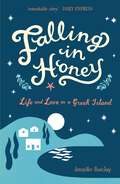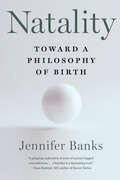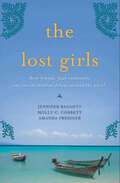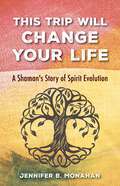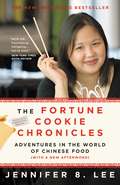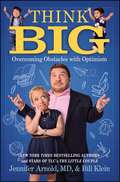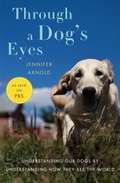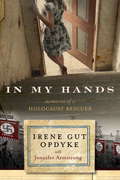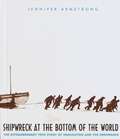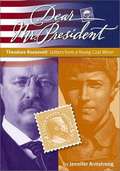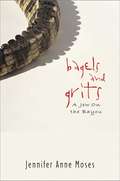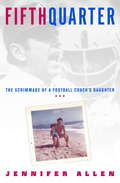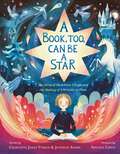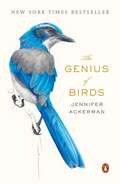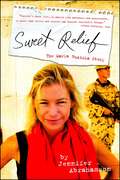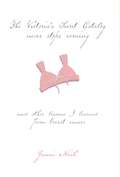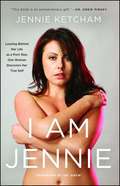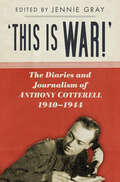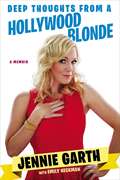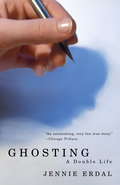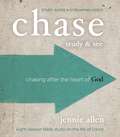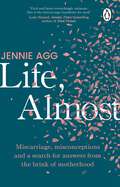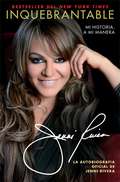- Table View
- List View
Falling in Honey: Life and Love on a Greek Island
by Jennifer BarclayOne heartbroken winter, Jennifer decides to act on her dream of moving to a tiny Greek island. Funny, romantic and full of surprising twists, Falling in Honey is a story about relationships, tzatziki, adventures, swimming, Greek dancing, starfish… and a bumpy but beautiful journey into Mediterranean sunshine.
Natality: Toward A Philosophy Of Birth
by Jennifer Banks“A gripping exploration of some of society’s biggest contradictions.… [Natality] is a fascinating read.” —Dana Suskind, MD, author of Parent Nation An exhilarating exploration of natality, a much-needed counterpoint to mortality, drawing on the insights of brilliant writers and thinkers. Birth is one of the most fraught and polarized issues of our time, at the center of debates on abortion, gender, work, and medicine. But birth is not solely an issue; it is a fundamental part of the human condition, and, alongside death, the most consequential event in human life. Yet it remains dramatically unexplored. Although we have long intellectual traditions of wrestling with mortality, few have ever heard of natality, the term political theorist Hannah Arendt used to describe birth’s active role in our lives. In this ambitious, revelatory book, Jennifer Banks begins with Arendt’s definition of natality as the “miracle that saves the world” to develop an expansive framework for birth’s philosophical, political, spiritual, and aesthetic significance. Banks focuses on seven renowned western thinkers—Arendt, Friedrich Nietzsche, Mary Wollstonecraft, Mary Shelley, Sojourner Truth, Adrienne Rich, and Toni Morrison—to reveal a provocative countertradition of birth. She narrates these writers’ own experiences alongside the generative ways they contended with natality in their work. Passionately intelligent and wide-ranging, Natality invites readers to attend to birth as a challenging and life-affirming reminder of our shared humanity and our capacity for creative renewal.
Hildegard of Bingen and Musical Reception
by Jennifer BainSince her death in 1179, Hildegard of Bingen has commanded attention in every century. In this book Jennifer Bain traces the historical reception of Hildegard, focusing particularly on the moment in the modern era when she began to be considered as a composer. Bain examines how the activities of clergy in nineteenth-century Eibingen resulted in increased veneration of Hildegard, an authentication of her relics, and a rediscovery of her music. The book goes on to situate the emergence of Hildegard's music both within the French chant restoration movement driven by Solesmes and the German chant revival supported by Cecilianism, the German movement to reform Church music more generally. Engaging with the complex political and religious environment in German speaking areas, Bain places the more recent Anglophone revival of Hildegard's music in a broader historical perspective and reveals the important intersections amongst local devotion, popular culture, and intellectual activities.
The Lost Girls: Three Friends. Four Continents. One Unconventional Detour Around the World.
by Jennifer Baggett Holly C. Corbett Amanda PressnerThree friends, each on the brink of a quarter-life crisis, embark on a year-long backpacking adventure around the world in The Lost Girls.“A triumphant journey about losing yourself, finding yourself and coming home again. Hitch yourself to their ride: you’ll embark on a transformative journey of your own.” —New York Times bestselling author Allison Winn ScotchWith their thirtieth birthdays looming, Jennifer Baggett, Holly C. Corbett, and Amanda Pressner are feeling the pressure to hit certain milestones—score the big promotion, find a soul mate, have 2.2 kids. Instead, they make a pact to quit their high-pressure New York City media jobs and leave behind their friends, boyfriends, and everything familiar to set out on a journey in search of inspiration and direction.Traveling 60,000 miles across four continents, Jen, Holly, and Amanda push themselves far outside their comfort zones to embrace every adventure. Ultimately, theirs is a story of true friendship—a bond forged by sharing beds and backpacks, enduring exotic illnesses, trekking across mountains, and standing by one another through heartaches, whirlwind romances, and everything in the world in between. “A real-life fairy tale for anyone who’s ever wanted to chuck it all and see the world with a best friend on each arm.” —Cathy Alter, author of Up for Renewal“Three cheers to The Lost Girls for showing us, with good humor and graceful prose, the beauty and importance of leading life astray.” —New York Times bestselling author Franz Wisner
This Trip Will Change Your Life: A Shaman's Story of Spirit Evolution
by Jennifer B. Monahan2016 USA Best Book Awards finalist in the Spirituality: Inspirational 1st Annual Body Mind Spirit Book Awards winner in Memoir and Shamanism categories Winner in the Body/Mind/Spirit category for the 2017 National Indie Excellence Awards Finalist in the Autobiography/Biography category for the 2017 Next Generation Indie Book Awards Honorable Mention in the Spiritual category for the 2017 Eric Hoffer Book Awards While Jennifer Monahan has always felt connected to the spirit world, she didn&’t fully realize how it had been orchestrating her life until a spur-of-the-moment trip to Yucatan, Mexico and a chance meeting with a Mayan shaman changed her life forever. This is the true story of Monahan&’s journey to finding and living her life purpose as a shaman. Filled with wisdom from her spirit guides and teachers that can benefit others looking for their life purpose, This Trip Will Change Your Life: Shaman's Story of Spirit Evolution shows how finding her true path made all the synchronistic &“threads&” in Monahan&’s life come together into a beautifully woven tapestry and life purpose that she could have never imagined on her own.
The Fortune Cookie Chronicles: Adventures in the World of Chinese Food
by Jennifer B. LeeIf you think McDonald's is the most ubiquitous restaurant experience in America, consider that there are more Chinese restaurants in America than McDonalds, Burger Kings, and Wendys combined. New York Times reporter and Chinese-American (or American-born Chinese). In her search, Jennifer 8 Lee traces the history of Chinese-American experience through the lens of the food. In a compelling blend of sociology and history, Jenny Lee exposes the indentured servitude Chinese restaurants expect from illegal immigrant chefs, investigates the relationship between Jews and Chinese food, and weaves a personal narrative about her own relationship with Chinese food. The Fortune Cookie Chronicles speaks to the immigrant experience as a whole, and the way it has shaped our country.
Think Big: Overcoming Obstacles with Optimism
by Jennifer Arnold Bill KleinBestselling authors of Life is Short (No Pun Intended) and stars of TLC's The Little Couple return with an inspirational book that encourages readers to reach for their dreams, no matter what obstacles they may face.Jennifer Arnold and Bill Klein have faced some big challenges in their lives. On the way to becoming a preeminent neonatologist and a successful entrepreneur--as well as parents and television stars--these two have faced prejudice, medical scares, and the uncertainty of life with special needs children. And even though they have dealt with fear, depression, hopelessness, and the urge to give up, they have found a way to persevere. Now they share their wisdom and encouragement for everyone who is facing their own challenges. Drawn from their most popular speaking presentation, Think Big is the inspirational guide for dreaming big, setting goals, and the steps you need to take to get there. Each section includes heartwarming anecdotes full of grace, humor, and wit plus a never-before-seen look inside their personal and professional lives. They have plenty of stories to tell and their unique approach to encountering life's greatest difficulties will inspire a call to action in all of us.
Through a Dog's Eyes: Understanding Our Dogs by Understanding How They See the World
by Jennifer ArnoldA "transformative,"* inspiring book with the power to change the way we understand and communicate with our dogs. Few people are more qualified to speak about the abilities and potential of dogs than Jennifer Arnold, who for twenty years has trained service dogs for people with physical disabilities and special needs. Through her unique understanding of dogs' intelligence, sensitivity, and extrasensory skills, Arnold has developed an exemplary training method that is based on kindness and encouragement rather than fear and submission, and her results are extraordinary. To Jennifer Arnold, dogs are neither wolves in need of a pack leader nor babies in need of coddling; rather, they are extremely trusting beings attuned to their owners' needs, and they aim to please. Stories from Arnold's life and the lives of the dogs who were her greatest teachers provide convincing and compelling testimony to her choice teaching method and make Through a Dog's Eyes an unforgettable book that will forever change your relationship with your dog. *Publishers Weekly
In My Hands
by Irene Gut Opdyke Jennifer ArmstrongAn utterly amazing, true, first-person account of one girlÂ's experience in wartime. Irene Gut Opdyke was a Catholic Polish nursing student when WWII broke out. She soon became mired in the horrors of central Europe as, at various times, a partisan, a refugee, a housekeeper to the Nazis and, over all, as a heroine. She singlehandedly saved the lives of at least 16 Jewish people from the Holocaust. Now living in America and aged 77, Irene, with the help of a respected historical novelist, has told her story with all the power and passion that such a remarkable history can inspire.
In My Hands: Memories of a Holocaust Rescuer
by Irene Gut Opdyke Jennifer ArmstrongIRENE GUT WAS just 17 in 1939, when the Germans and Russians devoured her native Poland. Just a girl, really. But a girl who saw evil and chose to defy it."No matter how many Holocaust stories one has read, this one is a must, for its impact is so powerful."--School Library Journal, StarredA Book Sense Top Ten PickA Publisher's Weekly Choice of the Year's Best Books A Booklist Editors Choice
Shipwreck at the Bottom of the World: the Extraordinary True Story of Shackleton and the Endurance
by Jennifer ArmstrongDescribes the events of the 1914 Shackleton Antarctic expedition when, after being trapped in a frozen sea for nine months, their ship, Endurance, was finally crushed, forcing Shackleton and his men to make a very long and perilous journey across ice and stormy seas to reach inhabited land.
Theodore Roosevelt: Letters from a Young Coal Miner
by Jennifer ArmstrongThe Dear Mr. President series brings history alive through fictitious correspondence between a president and a young person. These thought-provoking letters provide valuable insights into important moments in American history through their portrayal of issues from other times. Although the letters are imagined, they are all based upon meticulous historical research. To capture each president's personality and the voice of the youth of each time period, the authors draw on definitive books, firsthand interviews, and other reliable sources. Elegantly designed in two colors, the books include primary source material, reproductions of actual letters, a presidential biography, U.S. postal history, timelines, and an index. The interactive Web footnotes throughout the books are a unique feature of the Dear Mr. President series. These footnotes point readers to the series Web page at winslowpress.com for further information on a particular topic. This invaluable Web page encourages individual exploration, expertly guiding visitors through the vast resources of the Internet. There they will find primary source materials, links, historical sites, interactive games, and activities.
Bagels and Grits
by Jennifer Anne MosesWhen Jennifer Anne Moses moved from a comfortable life in East Coast Jewish society to Baton Rouge, Louisiana, she volunteered at an AIDS hospice and rediscovered a profound commitment to her Jewish faith. Outstanding Book, selected by the American Association of School LibrariansBest Books for Regional Special Interests, selected by the Public Library Association
Fifth Quarter
by Jennifer AllenSubtitled: The Scrimmage of a Football Coach's Daughter George Allen was a top-ranked NFL coach throughout the 1960s and 1970s, coaching in turn the Chicago Bears, the Los Angeles Rams, and the Washington Redskins. Raised in a home dominated by her three football obsessed older brothers and her father's relentless schedule, the author came of age in a cauldron of testosterone and a win-at-all-costs mentality. While the household was buffeted by the coach's tumultuous firings and hirings, which periodically propelled the family to a new city, Jennifer dreamed of being the first female quarterback in the NFL. But as she grew, she yearned mostly to be someone that her father would notice. In a world where only football mattered, what could she strive for, who could she become? Allen has written a memoir of the father she tried so hard to know, the family life that was wistfully sacrificed to his endless, fanatical pursuit of the Super Bowl. What emerges is a fascinating and singular behind-the-scenes look at professional football and a memorable, bittersweet portrait of a father and his daughter, told by an accomplished and assured writer.
A Book, Too, Can Be a Star: The Story of Madeleine L'Engle and the Making of A Wrinkle in Time
by Jennifer Adams Charlotte Jones VoiklisAn inspiring picture book biography of beloved author Madeleine L’Engle and the making of A Wrinkle in Time.When Madeleine L'Engle was very small, she often found herself awake at night, marveling at the stars. They guided her throughout her life, making her feel part of a big and exciting world, even when she felt alone. They made her want to ask big questions—Why are we here? What is my place in the universe?—and let her imagination take flight. Books, too, were like stars—asking questions and proposing answers. Books kept Madeleine company, and soon, she began to write and share her own. But would other people see the wonder she found in the world?Written by Madeleine's granddaughter Charlotte Jones Voiklis and bestselling picture-book author Jennifer Adams, A Book, Too, Can Be a Star follows the life of one of the world's greatest creators—and gives children encouragement to lead a creative, inquisitive life.
The Genius of Birds
by Jennifer Ackerman<P>Birds are astonishingly intelligent creatures. In fact, according to revolutionary new research, some birds rival primates and even humans in their remarkable forms of intelligence. Like humans, many birds have enormous brains relative to their size. Although small, bird brains are packed with neurons that allow them to punch well above their weight. <P> In The Genius of Birds, acclaimed author Jennifer Ackerman explores the newly discovered brilliance of birds and how it came about. As she travels around the world to the most cutting-edge frontiers of research-- the distant laboratories of Barbados and New Caledonia, the great tit communities of the United Kingdom and the bowerbird habitats of Australia, the ravaged mid-Atlantic coast after Hurricane Sandy and the warming mountains of central Virginia and the western states--Ackerman not only tells the story of the recently uncovered genius of birds but also delves deeply into the latest findings about the bird brain itself that are revolutionizing our view of what it means to be intelligent. <P>Consider, as Ackerman does, the Clark's nutcracker, a bird that can hide as many as 30,000 seeds over dozens of square miles and remember where it put them several months later; the mockingbirds and thrashers, species that can store 200 to 2,000 different songs in a brain a thousand times smaller than ours; the well-known pigeon, which knows where it's going, even thousands of miles from familiar territory; and the New Caledonian crow, an impressive bird that makes its own tools. <P>But beyond highlighting how birds use their unique genius in technical ways, Ackerman points out the impressive social smarts of birds. They deceive and manipulate. They eavesdrop. They display a strong sense of fairness. They give gifts. They play keep-away and tug-of-war. They tease. They share. They cultivate social networks. They vie for status. They kiss to console one another. They teach their young. They blackmail their parents. They alert one another to danger. They summon witnesses to the death of a peer. They may even grieve. <P>This elegant scientific investigation and travelogue weaves personal anecdotes with fascinating science. Ackerman delivers an extraordinary story that will both give readers a new appreciation for the exceptional talents of birds and let them discover what birds can reveal about our changing world. Incredibly informative and beautifully written, The Genius of Birds richly celebrates the triumphs of these surprising and fiercely intelligent creatures. <P><b>A New York Times Bestseller</b>
Sweet Relief: The Marla Ruzicka Story
by Jennifer AbrahamsonMarla Ruzicka was a free spirit, a savvy political operator, a wartime Erin Brockovich. Fiercely determined to improve the lives of the less fortunate, the twenty-something blonde was instrumental in convincing the U.S. government to pass historic legislation aiding civilian victims of war. Sweet Relief recounts Marla's journey from an idyllic childhood in a small California town, through Latin America and Africa, and finally to the war zones in Afghanistan and Iraq. Whether she was Rollerblading the halls of Congress to secure funds for civilians in Iraq or throwing parties for journalists in Kabul to raise awareness of her cause, no one who came within a hundred yards of Marla missed her. Her friendly smile and indefatigable pose were ubiquitous in Afghanistan and Iraq where Marla managed a door-to-door effort to identify war victims. While Marla worked tirelessly to care for others, in many ways she neglected herself. A diagnosed manic-depressive, Marla battled extreme emotional lows and an eating disorder. And although she brought love into the homes of the aggrieved, she often struggled to find a love of her own. Marla gave the invisible victims of war a voice and, in the process, helped to win them millions of dollars in unprecedented aid. Tragically, Marla was killed by a suicide bomber on Airport Road in Iraq in April 2005. Weeks later, the U.S. government named the program she fought so hard to establish The Marla Ruzicka Fund. Her life and legacy are an inspiring reminder that love and determination can conquer all.
The Victoria's Secret Catalog Never Stops Coming: And Other Lessons I Learned from Breast Cancer
by Jennie NashBreast cancer made Jennie Nash a wise old woman at the age of thirty-six. She learned, among other things, that her instincts are good, her kids are really resilient, and that, in the fight against breast cancer, the journey for patients, family, and friends can be a surprisingly positive, life-changing experience. Some five years younger than the AMA-recommended age for mammograms, Jennie Nash insisted she be tested, not because of a lump but because of a hunch brought on by a friend's battle with lung cancer. Jennie was as shocked to discover as her friend had been that cancer knows no age limits. From detection and surgery to reconstruction and recovery, Jennie gives readers a road map for a journey no one chooses to take. She details both the large and small lessons learned along the way: the importance of a child's birthday cake; the pleasure of wearing a beautiful, provocative red dress; how to be grateful rather than guilty when someone brings lasagne to the door; and that sometimes the only difference between getting to live and having to die is luck. A celebration of survival, Jennie Nash's account transforms one of life's most harrowing experiences into a story of reassurance and enlightenment.
I Am Jennie
by Jennie KetchamDrunk and high, holed up in a hotel room with a beautiful blonde she barely knew, Jennie Ketcham was thirty-six hours away from entering rehab. Her on-camera alter ego, Penny Flame, was a rising star. Her personal life, however, had been getting worse for years and finally hit an all-time low. Guys are gonna want one thing from you. To Jennie's young ears, her father's advice meant one thing: You can use your sexuality to control men. Life was imploding around her: her parents' divorce, their spiraling addictions, her deteriorating relationships with them. She lost her virginity at thirteen and began a game of initiating boys her age into manhood. For the fleeting moments she spent in bed with them, she got to be the center of attention. Eventually, Jennie found porn--that enticing world of immediate gratification, endless drugs, and seemingly endless money--and became Penny Flame. Divorced from her feelings, tempted into a lifestyle she couldn't afford, financially or emotionally, she entered Sex Rehab with Dr. Drew to boost her career. But when Dr. Drew and his staff insisted she go by her real name, the once indestructible walls she had built around herself began to burn down. Two stories make up this direct and disarming memoir: that of a troubled girl desperately fleeing intimacy and herself, and that of a woman courageously breaking down emotional barriers to build a new life. Many will recognize Jennie's struggles: confusing sex with self-worth, addiction with love, detachment with strength. Ultimately, I Am Jennie is a tale of a woman who considers herself a work in progress but who finally understands that the only person she can truly afford to be is herself. *** I had never allowed myself to wonder why i ran from people, from connection, from what Dr. Drew was labeling as intimacy. I had never questioned why I habitually hurt the men I dated, or the people in my family. I had never thought: Jennie, why are you doing this? In the past, I had simply acted, and then moved forward. If I felt like crying, I shut the emotions down. This quality made me a good porn star. But it suddenly didn't seem like a great way to live. "It's a wall," I whispered. "What do you think is behind that wall?" Dr. Drew said. He looked directly in my eyes. The thought of something existing behind this impenetrable wall was horrifying, exhausting. I grabbed a Kleenex, thinking if I could make the perfect triangle, I could dab my inner eyes without disrupting the glue that held my fake eyelashes in place. "Hopefully, a caring, sensitive person who can have meaningful relationships," I said.
'This is WAR!': The Diaries and Journalism of Anthony Cotterell 1940-1944
by Jennie GrayAnthony Cotterell wrote a unique form of war journalism – witty, sharp,engaging, and so vivid it was almost cinematic. As an official British Army journalist during the Second World War, he flew on bombing raids, sailed with merchant shipping convoys, crossed to France on D-Day, and took part in the Normandy Campaign. During this time he kept a diary, a hilarious and caustic record of his role in the war, a diary which abruptly ended after he vanished in mysterious circumstances after the battle of Arnhem bridge in 1944. Cotterell’s diary and selected war journalism, illustrated with previously unpublished photographs, are presented together here to shed new light not only on the everyday life of the British Army in the Second World War but also on the role of the press during times of conflict. The quality of his writing is truly captivating and his account of the Normandy campaign is surely the nearest that a modern reader will ever get to experiencing what it was like to be in the thick of a Normandy tank battle.
Deep Thoughts From a Hollywood Blonde
by Jennie Garth Emily HeckmanFor the first time ever, Jennie Garth is putting it all out there, sharing her joys and her sorrows, her successes and her failures, with candor and a surprising, even bawdy, sense of humor. From her sudden rise to fame as a golden-haired teen beauty, to recently redefining herself as a single working mother to three growing girls, Jennie Garth has defied the odds and thrived in a town that can be more than a little tough on its blondes. Since Jennie landed in Hollywood at just sixteen, she has built an enduring career as a television and film actress, producer and director, beginning with her iconic turn as Kelly Taylor on Aaron Spelling's smash hit Beverly Hills 90210, a show that ran for a decade and which cemented Jennie's place in American pop culture. Recently, Jennie found herself facing her forties from a place she never expected to be in: newly single, in demand again as an actress after years spent focusing on her family, and all over the tabloids. So she decided to do what surprised many#151;including herself: she decided to write about it, to tell her own story, in her own words. And now, in this intimate memoir, she explores the highs and lows of her life, both in front of the camera and behind closed doors, revealing the real Jennie Garth#151;smart, funny, and stronger than she ever realized. This is one unforgettable, utterly loveable Hollywood Blonde, and these are her deep thoughts. "No one warned me that deciding to write a book about my life would unleash all of the insecurities, fears, and self-doubts I'd been trying to outwit and outrun my whole life, but that's exactly what happened. I wanted to tell my truth with as much courage as I could muster and to be as fearless as possible as I delved into the darker corners of my mind. The result surprised me: I got to know myself in new ways. Revealing myself in these pages has been at times terrifying, but also one of the most liberating experiences of my life. That's because once you start writing, all of these embarrassing, wonderful, hilarious, painful, and surreal things that make you who you are get flushed up to the surface. And so word by word, I began to put the story of me together. Now all of these personal recollections, memories and anecdotes have been printed and bound into this book, which means that now you get to know me, too. " #151;Jennie Garth
Ghosting: A Double Life
by Jennie ErdalJennie Erdal worked for nearly fifteen years for the flamboyant, extravagant, larger-than-life "Tiger," a London publisher, entrepreneur, and media personality. Officially, she was his personal editor. In truth, Erdal was his ghostwriter and alter ego. Under his name, she produced not only newspaper columns, business columns, and novels, but even love letters. In temperament, the two couldn't have been more different. Yet their relationship weathered storms of all kinds, from temper tantrums to serious financial reversals, with a tenacious bond that is both a wonder and an enigma. With effortless grace, gentle erudition, and wry humour, Erdal shows us vivid snapshots of an austere childhood in Scotland and of the London publishing world, peopled by the elegant and the "Oxbridge"-educated. She introduces us to a thoughtful girl who found her passion in language and the magic of words, a passion that led her by a series of chance events to the publishing house, and the strange, wonderful, and never-dull world of the inimitable Tiger. As original as it is elegant and witty,Ghostingis a remarkable memoir -- more than just one woman's story, it is the tale of her double life, as well as a fascinating glimpse into the symbiotic relationship between two very unusual people.
Chase Bible Study Guide plus Streaming Video, Updated Edition: Chasing After the Heart of God
by Jennie AllenWhat are you chasing?We're all chasing after something, something that we think will make us happy—comfort, success, a bigger house, or someone's approval. But if we are all honest, it feels like trying to catch the wind.A man after God's own heart . . . As David's life weaves throughout the pages of Scripture, we see he was a man who spent his life chasing after God. Chase explores the events that defined David's life and the Psalms that flowed out of those experiences. Through David's example we'll discover what God really wants from us.The lessons in this study guide are simple, yet deep and very interactive. Dig into Scripture with Bible study, stories, and projects to deeply engage the mind and heart. Whether you are running from God or working your tail off to get closer to Him, David's journey will challenge your view of God.God is the only thing we can chase that won't leave us feeling more empty.This study guide includes:Individual access to eight streaming video sessionsPersonal Bible studies and interactive projectsFull Leader's Guide with tips and resourcesHow to Find God personal salvation guideStreaming video access included. Access code subject to expiration after 12/31/2029. Code may be redeemed only by the recipient of this package. Code my not be transferred or sold separately from this package. Internet connection required. Void where prohibited, taxed, or restricted by law. Additional offer details inside.
Life, Almost: Miscarriage, misconceptions and a search for answers from the brink of motherhood
by Jennie Agg'Vital and heart-wrenchingly intimate' Leah Hazard'Urgent, fascinating and thought-provoking' Julia Bueno'Thoughtfully researched and beautifully written' Pippa VosperAfter losing four pregnancies with no obvious cause, Jennie Agg set out to understand why miscarriage remains such a profoundly misunderstood, under-researched and under-acknowledged experience.Part-memoir, part-scientific investigation, Life, Almost documents Agg's path to motherhood and her search for answers. Tracing each tentative step of her fifth pregnancy - as her body becomes a creature she does not wish to spook - Agg dismantles the myths that we unquestioningly accept about our reproductive lives:· Why are we told miscarriage can't be prevented when half of all miscarriages are of perfectly healthy embryos?· Why is it normal not to tell anyone you're pregnant for the first three months? · Why don't we know why labour starts? Drawing on pioneering research and interviews with world-leading experts, Life, Almost is a ground-breaking book that will change how you think about miscarriage, and a moving reflection on grief and love at the edge of life as we understand it.
Inquebrantable
by Jenni RiveraLa única autobiografía autorizada de Jenni Rivera Jenni Rivera es la talentosa y aclamada cantante méxico-americana de música norteña, conocida como La Diva de la Banda, que falleció en un accidente aéreo el 9 de diciembre de 2012. Jenni había estado escribiendo su autobiografía, Inquebrantable, durante algunos años.Jenni Rivera fue madre de cinco hijos, abuela de tres nietos, cantante, compositora, actriz, productora de televisión, protagonista del show de televisión I Love Jenny y empresaria. Su vida estuvo llena de tragedias, problemas personales, perseverancia y éxito. Se convirtió en la cantante de música en español de mayor éxito en Estados Unidos con ventas récord de más de 15 millones de CDs. La vida personal de Jenni siempre estuvo en el centro de muchas historias en los medios de comunicación que expusieron su vida no tan perfecta. A Jenni la caracterizó la franqueza con la que hablaba de sus problemas personales y que la ayudó a formar un vínculo inquebrantable de confianza con sus fans. Como consecuencia, Jenni se convirtió en una figura de fortaleza y una fuente de inspiración para todas las mujeres. Inquebrantable es la única autobiografía autorizada por la familia de la cantante. En ella Jenni revive los momentos más cruciales de su vida y dificultades que nunca discutió públicamente. Jenni habla sobre sus experiencia de violencia doméstica, abuso sexual, sus divorcios, problemas de imagen personal por su peso, sus triunfos en una industria dominada por los hombres y cómo crió a sus cinco hijos como una madre soltera. En su libro, Jenni nos demuestra que nunca dejó de ser la Rivera rebelde de Long Beach, la joven que nunca perdía su sentido del humor, su positivismo y su espíritu luchador. "Son cosas muy fuertes las que han pasado en mi vida. No puedo enfocarme en lo negativo; eso te derrota, te destruye. Soy una mujer como cualquier otra. Las veces que me he caído me he levantado". --Jenni Rivera
